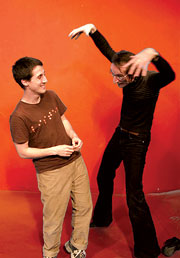“The real is not only what can be reproduced, but that which is always already reproduced.” So wrote noted semiologist Jean Baudrillard to describe his theory of hyperreality, a pillar of late-20th-century post-structuralism.

Baudrillard passed away in March, but his description could just as easily serve as a publicity sheet for The Books, who bring their cut-and-paste musical-collage aesthetic to the Orange Peel April 18 along with avant-garde violinist Todd Reynolds. Since their 2002 debut, Thought for Food, the innovative collaboration between guitarist Nick Zammuto and cellist Paul de Jong forced some to re-think their notions of how far avant-pop can go, and others to reconsider just what constitutes music in the first place.
The Books, it must be said, didn’t invent the audio collage or come up with the idea of incorporating found sound—door squeaks, conversation, jackhammers, etc.—into their music. That goes back at least as far as the late 1940s and the musique concrete movement, and has been essential to the works of everyone from John Cage and Eno to Four Tet and Califone.
What the Books did, however, was raise the ante considerably. Rather than bristling against the attention-taxing information overload of modern life, the Books embraced it. In the process, they tamed it and imposed an accessible—and very human—musical logic on it. It may not be the first time someone has mashed together acoustic guitars and cellos with voice collages and found-sound samples, but it’s one of the rare examples where they’re equal partners.
“When we were cavemen, we were lucky if we heard 100 voices in our lifetime,” says Zammuto. “But when you hear 100 voices a day—how do you reconcile that? It’s so new and fantastic. So the music is a way to make the noise bearable, to make sense out of it in a way that’s spiritually satisfying and that makes us smile rather than go insane.”
That’s why, over the course of their three records—including 2004’s The Lemon of Pink, recorded in local Hot Springs, and 2005’s Lost & Safe—you can hear the Books spin musical gold out of audio straw from: snippets of two characters discussing body-image issues in Jean Luc-Goddard’s film Contempt, over a plucked waltz; a disciplinarian scolding a child against a banjo-and-strings Oriental theme; intercontinental radio transmissions and bouncing ball (literally) percussion; Winston Churchill giving a radio address while a ragtime plays; Zammuto singing the Tao Te Ching‘s 20th verse over a manipulated clavinet; and a Berlitz catalog of foreign languages.
In the Books’ world, the human voice is an instrument all its own, and each spoken sentence is “its own little guitar solo,” says Zammuto. To that end, the band collects obscure recorded material—and equally esoteric video for their live show projections—and catalogs it into an extensive sample library.
Songs can then be constructed starting with nothing more than a voice intoning the alphabet, a guitar riff, or even—gasp!—a simple melody. If a banjo or cello line pleases, the duo dig through their files for a suitable sample that fits, say, a 7/4 time signature, an allotted time-span, and the overall aesthetic of the song. On the other hand, if a snippet of conversation commands their attention, they build around that.
“Eventually we have a body of sound that works nicely together,” says Zammuto, “and from there we start to figure out how it might begin and how it might end, and where it can go. So it’s like a snowball, gaining momentum and growing in size.”
And of course most everything gets sliced-and-diced through the Books’ computers, creating a Gordian knot of glitch and guitar, organic acoustics and digitized computer effects. The contrasts even extend to the duo: Zammuto, 31, majored in chemistry, not music; was weaned on classic rock and Nirvana; and counts among his life-altering experiences hiking the Appalachian Trail from Maine to Georgia in 2001. De Jong is 42, classically trained, was reared on a diet of avant-garde music, and is the thrift-store treasure-hunting expert.
On Lost & Safe, the Books extended their approach to include Zammuto’s sung lyrics for the first time. That, however, created a mini firestorm, and some previous supporters dubbed the record too traditional (surely a shock to any first-time Books listener). Zammuto says they missed the point entirely, because all the lyrics were taken from existing texts—including two that are more than 2,500 years old—and only reflected the band’s interest in adding another experimental dimension to the music.
He also says he’s just beginning to explore the balance between lyrics, found sounds, and traditional song structure. But he insists the fundamental nature of the Books and the way they record will remain the same.
“Computers have ushered in a new kind of folk music,” he says. “Not to bastardize that word more than it already is, but it allows pretty much anybody to create music within small circles, within the context of their friends or families, and within their own homes.
“It’s a new way of working that allows us to live really close to the ground financially, and circumvents the whole studio atmosphere and corporate aspect of music.”
[John Schacht is a regular contributor to Harp magazine and Allmusic.com]
The Books play the Orange Peel (101 Biltmore Ave.) on Wednesday, April 18, with Todd Reynolds. 9 p.m. $15. 225-5851



Before you comment
The comments section is here to provide a platform for civil dialogue on the issues we face together as a local community. Xpress is committed to offering this platform for all voices, but when the tone of the discussion gets nasty or strays off topic, we believe many people choose not to participate. Xpress editors are determined to moderate comments to ensure a constructive interchange is maintained. All comments judged not to be in keeping with the spirit of civil discourse will be removed and repeat violators will be banned. See here for our terms of service. Thank you for being part of this effort to promote respectful discussion.